
For more material and information, please visit Tai Lieu Du Hoc
at www.tailieuduhoc.org
29
Choice Questions
Answer with a complete sentence.
1. Have they bought Sarah a sweater or a coat?
2. Has she put the sweater on or has she put it away?
3. Has Mrs. Clark received good news or bad news?
4. Has she lost her house or her job?
5. Has she bought a few things or a lot of things?
6. Has she saved a lot of money or a little money?
Time Markers
Punctual verbs: has asked, has bought, has decided, has heard,
has lost, has opened, has put on, has returned
One meaning of the present perfect tense is that an action has been completed before the
present time. This action has an effect on the present situation, but it is not happening in
the present. The verbs above describe completed actions which took place at one point in
time. Durative verbs are not often used for this meaning of the present perfect tense. What
is important here is not how long the activity lasted, but that it is finished. In this time line,
the X is especially dark to represent the fact that the action is completed. Common time
markers are: already, not yet , and j ust .
Answer the questions below in the present perfect tense. Use a time marker in each
sentence.
1. Are Mrs. Clark and Sarah returning home now? (just)
No, they've just returned home.
2. Is Sarah putting on her sweater now? (just)
3. Is Sarah removing the tag now? (not yet)
4. Is Mrs. Clark opening the letter now? (just)
5. Is Mrs. Clark receiving bad news now? (just)
6. Is she losing her job now? (already)
7. Is the musician deciding now to stop work? (already)
8. Is he asking her now to find another job? (already)
9. Is she buying a house now? (already)
10. Is she paying for the house now? (not yet)
Listening Discrimination
Listen to the sentences as your teacher reads them. If the sentence is in the present
continuous, respond with the time marker “now.” If the sentence is in the present perfect,
respond with the time marker “already.”
1. He's returning home.
2. She's buying a new house.
3. She's bought some new clothes.
4. She's putting them on.
5. He's opened the letter.
6. He's removing the tag.
7. He's asked his secretary.
8. He's decided about his job.
9. She's paid for everything.
10. She's crying about her job.

For more material and information, please visit Tai Lieu Du Hoc
at www.tailieuduhoc.org
30
Time Lines
Make sentences with the verbs below. Use the tense which is indicated in each time line.
1. 2.
have returned bought
3. 4.
has put it on haven't removed
5. 6.
has asked is crying
7. 8.
has not paid doesn't understand
9. 10.
has heard has never cried
Pronunciation
In normal spoken English, pronouns contract with the auxiliary verbs has and have in the
present perfect tense. He's /hɪz/, she's /ʃɪz/, and it's /ɪts/ sound just like the contractions
for he + is, she + is, and it + is. Practice the sentences below.
1. I've been out shopping.
2. You've returned home.
3. He's bought a new sweater.
4. She's opened a letter.
5. It's upset her a lot.
6. We've received bad news.
7. They've lost their money.
Other subjects may combine with has and have in spoken English, too. These are reduced
forms. They are not written as contractions, but are pronounced that way.
1. Mrs. Clark has received bad news.
2. Sarah has removed the tag from the sweater.
3. The musician has decided to stop working.
4. The secretary has worked for a year.
5. The letter has upset her a lot.
6. The news has always been bad.
7. The house has cost a lot of money.
8. The clothes have come from the store.
chapt er eight I T'S DI FFI CULT TO SAY GOOD- BYE
The present perfect tense
HAVE (or HAS) + PAST PARTICIPLE
vocabulary:
journalism
reporter
Reading Selection
Listen to the teacher read the selection. Then repeat as the teacher reads in phrases.
( )
( )
( )

For more material and information, please visit Tai Lieu Du Hoc
at www.tailieuduhoc.org
31
People often travel to other places to study or to work. Ralph is going to get on the train
and travel to a new job. He's saying good-bye to his girl friend Stella and her brother Tom.
The three friends have known each other for many years. They've been neighbors since
they were children. Ralph has lived next door to Stella and Tom for fifteen years. They've
grown up together, they've gone to school together, and they've visited each other almost
every day.
Stella and Ralph have been an important part of each other's lives, so it's difficult to say
good-bye. They've studied journalism together, and they've worked as reporters for a small
town newspaper. Now Ralph has a job working for a big city newspaper 500 kilometers
away. Ralph and Stella will miss each other very much, but Ralph will come home again on
his vacations.
Questions
1. Who is going to travel on the train?
2. Who is saying good-bye to Ralph?
3. How long have they all known each other?
4. Where has Ralph lived for fifteen years?
5. Who has grown up with Ralph?
6. Where have they gone every day?
7. How often have they visited each other?
8. Where have Ralph and Stella worked?
9. Where is Ralph going to work now?
10. Why is it difficult for them to say good-bye?
11. How will Stella feel when Ralph is gone?
12. When will Ralph come home?
Time Markers
Durative verbs: has been, has lived, has known,
has studied, has worked

For more material and information, please visit Tai Lieu Du Hoc
at www.tailieuduhoc.org
32
One job of the present perfect tense is to show an activity or a state that has continued for
a period of time, from a point in the past until the present. (Notice two things about this
meaning that are different from the meaning of the tense in the last chapter. With the time
picture above, the action is not completed; it is still continuing in the present. Second, it is
the length of time that is important.) In these time lines, the arrow part of the picture is
dark. This is to emphasize the length of time that the activity has continued. Durative verbs
are common in this meaning of the present perfect tense. Time markers for this idea are:
for (for many years) and since (since they were children).
Punctual verbs: has visited, has seen, has gone, has talked
If a punctual verb is used this way, we know that the action was repeated many times for a
period of time. For example, “They have visited each other every day for fifteen years.” In
this sentence, there are two time markers. One shows the frequency (every day) and the
second shows the duration (for fifteen years).
Make sentences out of the groups of words below. Each sentence should be in the present
perfect tense and should show an activity or a state which began in the past and has
continued to the present.
1. know / for many years
2. be friends / since 1965
3. be neighbors / for fifteen years
4. live next door to her / since 1965
5. go to school / every day / for twelve years
6. visit her / every day / for two years
7. study journalism / since 1975
8. work as a reporter / for three years
9. be important to her / for a long time
10. love her / since I met her
Contrasting Completed Action and Duration
Listen to the sentences as your teacher reads them. If the sentence shows completed
action, respond with the time marker “already.” If the sentence shows duration, respond
with the time marker “for many years.”
1. Ralph has met Stella.
2. Ralph has known Stella.
3. Ralph has moved next door to Stella.
4. Ralph has lived next door to Stella.
5. Ralph has gone to school today.
6. Ralph has gone to school every day.
7. Ralph has worked in journalism.
8. Ralph has lost his job.
9. Ralph has taken another job.
10. Ralph has loved Stella.
11. Ralph has visited Stella every day.
12. Ralph has said good-bye to Stella.
Changing Times, Changing Tenses
Repeat each sentence after your teacher. Then use a different time marker and change the
tense to agree with it.
1. Ralph is visiting Stella now . (every week - already)
Ralph visits Stella every week.
Ralph has visited Stella already.

For more material and information, please visit Tai Lieu Du Hoc
at www.tailieuduhoc.org
33
2. They go to school together every m orning. (this morning - for many years)
3. Ralph has studied journalism for t wo years. (these days - every evening)
4. Ralph isn't coming home to visit this m ont h. (every month - yet)
5. He often travels to London. (now - every month for a year)
6. He isn't taking the train. (usually - yet)
7. They're working together on the newspaper today. (every day for six months - seldom)
8. She isn't writing him a letter now. (often - for three weeks)
9. His boss doesn't hire any new reporters in t he sum m er. (this summer - for a year)
10. Stella works for the small newspaper occasionally. (these days - for a long time)
Pronunciation
In normal spoken English, the question words usually combine with the auxiliary verbs has
and have. These are reduced forms. They are not written as contractions, but they are
pronounced that way.
1. How long have they known each other?
2. Where has Ralph lived for fifteen years?
3. Who has grown up with Ralph?
4. Where have they gone every day?
5. How often have they visited each other?
6. What have Ralph and Stella studied?
Listening Discrimination
Listen to the sentences as your teacher reads them. If the sentence is in the present
continuous, respond with the time marker “now.” If the sentence is in the present perfect,
respond with the time marker “already.”
1. Who's gone to the big city?
2. Who's traveling on the train?
3. Who's saying hello to new friends?
4. Who's grown up to be a journalist?
5. Who's visited his sick friend?
6. Who's studying medicine?
7. Who's working on the newspaper?
8. Who's come home?
chapt er nine ARE BUSES AS EASY TO USE AS CARS?
vocabulary:
traffic decrease
complain schedule
smart convenient
parking place
the present perfect continuous tense
HAVE (or HAS) + BEEN + VERB + ing
Reading Selection
Listen to the teacher read the selection. Then repeat as the teacher reads in phrases.
When the weather is cold, it's not very much fun to wait for a bus. These people have been
standing on the corner for fifteen minutes. They've been watching the traffic, looking for the
bus, and hoping it will come soon. They've been talking about the bus and complaining
about the weather. Most of them feel cold. One smart man has been drinking coffee to stay
warm.

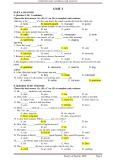
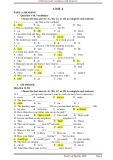
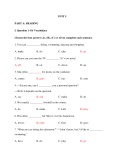
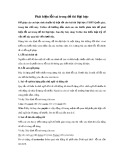
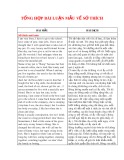
![Bộ tài liệu học vỡ lòng Tiếng Anh [mới nhất]](https://cdn.tailieu.vn/images/document/thumbnail/2020/20200504/lanxichen/135x160/1651588587086.jpg)
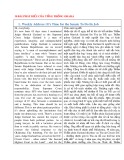
![Đề cương Tiếng Anh phổ thông [năm học]: Tổng hợp đầy đủ nhất](https://cdn.tailieu.vn/images/document/thumbnail/2019/20190717/thukhuyen1257/135x160/7691563342337.jpg)
![10 modals là gì? [Năm hiện tại]](https://cdn.tailieu.vn/images/document/thumbnail/2018/20181029/hongduc7981/135x160/3551540823056.jpg)
![Tài liệu Ôn tập tiếng Anh [chuẩn nhất/mới nhất]](https://cdn.tailieu.vn/images/document/thumbnail/2018/20181013/soandethi/135x160/9551539429153.jpg)



![Từ vựng tiếng Anh về thức ăn và giảm cân [mới nhất, đầy đủ]](https://cdn.tailieu.vn/images/document/thumbnail/2025/20251217/nglinh.diamond@gmail.com/135x160/53091766028543.jpg)


![Tài liệu Từ vựng tiếng Anh Trung cấp [mới nhất]](https://cdn.tailieu.vn/images/document/thumbnail/2025/20250913/nguyentuan250421@gmail.com/135x160/99491757910839.jpg)
![Tài liệu Từ vựng Tiếng Anh theo chủ đề [mới nhất]](https://cdn.tailieu.vn/images/document/thumbnail/2025/20250913/namdhuet@gmail.com/135x160/83251757753810.jpg)



![Tài liệu Từ vựng tiếng Anh cho bé [chuẩn nhất/mới nhất]](https://cdn.tailieu.vn/images/document/thumbnail/2025/20250731/huadaithesang2509@gmail.com/135x160/18631754013896.jpg)



